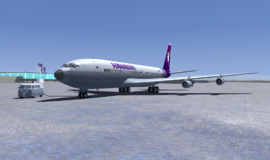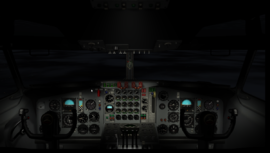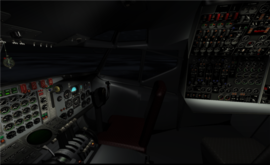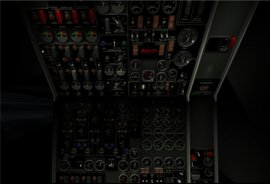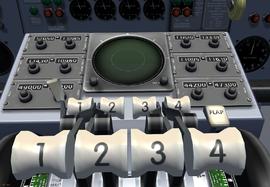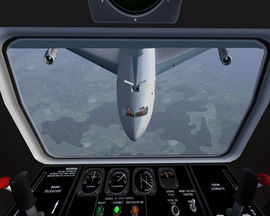Boeing 707
 | |
|---|---|
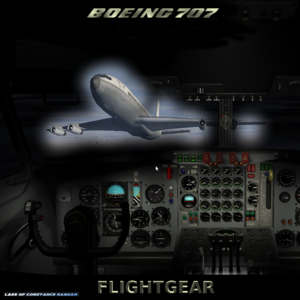 The 707's splash screen | |
| Type | Airliner, Military tanker aircraft |
| Configuration | Low wing aircraft, Monoplane aircraft, Retractable gear aircraft, Tricycle landing gear aircraft |
| Propulsion | Quadjet (Jet aircraft, Four-engine aircraft) |
| Manufacturer | Boeing |
| Author(s) |
|
| FDM | JSBSim |
| --aircraft= |
707 707-TT 707-PAX EC-137D |
| Status | Advanced production |
| FDM |
|
| Systems |
|
| Cockpit |
|
| Model |
|
| Supports |
|
| Development | |
| Hangar |
|
| Website |
|
| Repository |
|
| Download |
|
| License | GPLv2+ |
|
| |
The Boeing 707 is a four-engine commercial passenger jet airliner developed by Boeing in the early 1950s. Its name is most commonly spoken as "Seven Oh Seven". Boeing delivered a total of 1010 Boeing 707s, which dominated passenger air transport in the 1960s and remained common through the 1970s. Boeing also offered a smaller, faster version of the aircraft that was marketed as the Boeing 720.
Although it was not the first commercial jet in service, the 707 was among the first to be commercially successful, and is generally credited as ushering in the Jet Age. It established Boeing as one of the largest makers of passenger aircraft, and led to the later series of aircraft with "7x7" designations.
Variants
The 707 was a convertible passenger/freight configuration which became the most widely produced variant of the 707. Despite the convertible option, a number of these were delivered as pure freighters.
Later 707-420 were versions with Rolls-Royce Conway 508 turbofans. First appearing in 1960, 37 examples were delivered to BOAC, Lufthansa, Air India, El Al and Varig through November 1963.
This FlightGear model has the fuselage/wings of the 707-320C. Users can select from the the older Rolls-Royce Conway 508 turbofans engines and the later JT3D engines simply by changing liveries. Note however that the flight model only uses the Rolls-Royce Conway engines and thus the difference is purely cosmetic.
Included
- 707: Passenger airliners capable of seating 147 passengers.
- 707-TT (Tanker Transport): An Italian tanker variant. Can be used for air-to-air refueling.
- EC-137D: An AWACS variant that later evolved into the E-3 Sentry.
Aircraft help
The 707 has a detailed built-in tutorial in German, English, Czech, Portugues and Spanish. You can help translate the tutorial into other languages by visiting our page on github.
Cheat sheet
| Key | Function |
|---|---|
| Delete | Deploy reverse thrust. |
| ⇧ Shift + B | Set or unset the parking brake. |
| Control + B | Deploy the speedbrakes. |
| G | Raise the landing gear. |
| ⇧ Shift + G | Lower the landing gear. |
| ] | Lower the leading and trailing edge flaps. |
| [ | Raise the leading and trailing edge flaps. |
| y | Hide or show the cockpit yokes. |
| < | Toggle between pilot and engineer views. |
| F9 | Open the fuel and weight controls. |
| F11 | Focus or unfocus the view on the autopilot controls. |
Usability
The aircraft's philosophy is based on the WYSIWYG concept. Everything you see on the panels is clickable - and works.
The light effects in the cockpit are made with extra attention to detail, with the aim of giving the user the most realistic experience possible. The hope is that the pilot to feel as if they are actually in the plane itself.
On the other hand, the 707 is also focused on usability for new users. For example, the generic autopilot dialog has been retained, and an autostart function is available. Tutorials are available in several languages. All this is done with the aim of making things easy for first-time users while also allowing them to learn and have fun.
Compatibility
The 707 has been tested on several platforms, including GNU/Linux, Windows XP to Windows 10 and Mac OS X from FlightGear 2.10 to 2016.2 and GIT, and has passed all tests with flying colors. Over 15 users have helped test the aircraft throughout its evolution.
Additionally, members of the beta testing team have visited the German Technical Museum in Munich and verified the model's accuracy.
Get certified
It has been estimated that the 707 certification takes about 400 hours of flight time. We will grant 707 Knight Sky Class Certification to those pilots who reach 400 hours. Additionally, we will be giving away a 707 "City of Friedrischafen" custom set of wings, diploma, and avatar.
The aircraft has been fully tested and certified. Now it's your turn. Be a part of the legend.
Multiplay
In multiplay, some parts of the 707 are hidden (wings, tail, doors)
to fix this, edit the model file (example : Aircraft/707/Models/707-TT.xml) and remove the slash before /sim/current-view/internal :
<condition>
<not><property>sim/current-view/internal</property></not>
</condition>
Thanks to...
- Innis Cunningham and all the developers who have contributed to FlightGear
Test pilots
- D-3m
- D-AHGM
Technical systems assistance
- D-LEON
Custom autopilot integration
- buster
Bug smashers
- D-STHO
- D-ABBA
| |||||||||||
| |||||||||||||||||
- Airliners
- Military tanker aircraft
- Low wing aircraft
- Monoplane aircraft
- Retractable gear aircraft
- Tricycle landing gear aircraft
- Quadjets
- Jet aircraft
- Four-engine aircraft
- Boeing
- Interactive Tutorial Support
- Aircraft with Checklists
- Rembrandt aircraft
- Air refueling ready
- GPLv2+
- FGAddon hangar
- Lake of Constance hangar
- All aircraft
- Aircraft with cabin view
- Red Griffin ATC compatible aircraft
